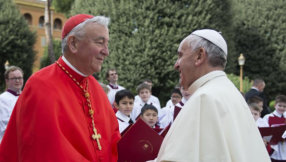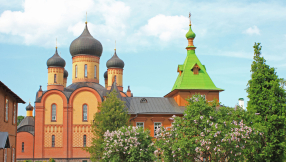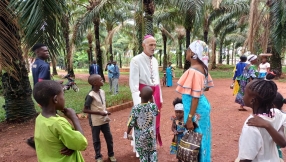
A report released ahead of the Methodist Church's Conference this summer has recommended changing the rules to allow same-sex weddings to take place in its chapels.
The recommendation was made in a report called 'God in Love Unites Us', prepared by the Methodist Church's Marriage and Relationships Task Group.
It has been drawn up in light of huge changes in society regarding same-sex relationships, including the legalisation of civil partnerships and same-sex marriage in the last 15 years, but also the Government's most recent announcement last year to open up civil partnerships to heterosexual couples.
The task group added that there was a need to address the "hurt" felt by those in the Methodist Church who feel that its current definition of marriage implies that they are "lesser persons".
"Reflecting on this matter, the Task Group urges the Conference to affirm in due course those who enter mixed-sex civil partnerships, just as it has affirmed those who enter same-sex civil partnerships," the report states.
"Where it is appropriate, we would then welcome it if the relationship that has led a couple to enter a partnership were to strengthen further and bring them to seek marriage as the Church understands it.
"That said, where couples are open and receptive to the possibility of discerning God's love present in what has brought them to form their partnership, and where real pastoral need exists for not simply offering the couple an opportunity to marry in church, we believe it would be appropriate for the Church to offer thanks for and bless such partnerships on its premises.
"This would require developing and offering appropriate forms of prayer and orders of service."
A clause has been included in the proposals to ensure that ministers who object on grounds of conscience do not have to officiate at a same-sex marriage.
Elsewhere, the report says that the Church should be supportive of couples who are cohabiting "but for whom marriage is a difficult option".
The task group recommends that the Church "recognises that the love of God is present within the love of human beings who are drawn to each other, and who enter freely into some form of life-enhancing committed relationship with each other, whether that be through informal cohabitation or a more formal commitment entered into publicly".
"As a Church we wish to celebrate that the love of God is present in these circumstances, even if that grace is not responded to or even discerned by the people concerned," it states.
"The Church has an important calling, therefore, to point to the presence of God's love within such relationships, and to encourage people to respond to it in the renewing and deepening (by whatever means) of their commitment."
The recommendations will be put before the Methodist Conference when it is held in Birmingham from June 27 to July 4.
If the Conference commends the 67-page report to the Connexion for study and prayerful discussion, the report will then be presented to synods from September 2019 before a vote takes place on the proposals the following spring. A final report will then go before the 2020 Methodist Conference.
Rev Ken Howcroft Chair of the Task Group said: "Relationships, sex and marriage are significant issues for everyone and it's important that the Church talks about these matters today.
"As part of its calling and mission the Methodist Church must engage with the reality of how people are living. That raises questions about the nature of marriage, cohabitation, living in relationships and living with different sexualities.
"Members of the Task Group come from very different theological backgrounds, yet we have sought to understand each other's viewpoint and where we have disagreed, to do so well. What we share in loving God and in knowing we are loved by God, is much greater than anything that divides us."
Rev Ashley Cooper from the Task Group said: "No report or set of recommendations will be adequate to hold all the complexities of the issues. We believe that our recommendations will enable Methodists to respect each other's sincerely and faithfully held opinions and practices."













